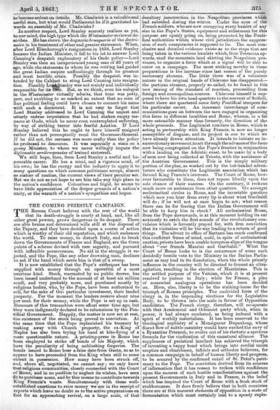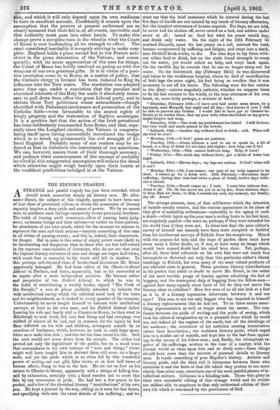THE COMING PRIESTLY CAMPAIGN.
r Roman Court believes with the rest of the world illThat its death-struggle is nearly at hand, and, like all -other great powers, grows dangerous in its despair. There .are able brains and determined wills still at the disposal of the Papacy, and theihave decided upon a course of action which is worthy of their old reputation, and which embraces the world. To raise money, to disturb Italy, and to break down the Governments of France and England, are the three _points of a scheme devised with rare sagacity, and pursued with inflexible perseverance. No aid in the struggle iFt re- jected, and the Pope, like any other drowning man, declines to ask if the hand which saves him is that of 'a sweep. It is now established that the Pope's eXChequer has been supplied with money through an operation of a most usurious kind. Stock, warranted by no public decree, has been issued underhand to the amount of at least six million scudi, and very probably more, and purchased mostly by religious bodies who, by the Pope, have been authorized to s411, for the sake of this particular investment, their landed property. For the moment the lenders receive about nine per cent, for their money, while the Pope is set up in cash. Rumours of this transaction were afloat some time ago, but they were indignantly declared to be calumnious by the Pon- tifical Government. Happily, the matter is now set at rest, the existence of the stock being proved to conviction. At the same time that the Pope replenished his treasury by making away with Church 'property, the ex-King of Naples has also been trying his hand at kite-flying of a more questionable nature. A printing-press in Rome has been employed to strike off bonds of his Majesty, which have the peculiarity of being unblushing forgeries. The bonds issued in Rome bear a false date from Gaeta' so as to A pp ear to have proceeded from the King when still to some extent in possession. How many have been struck off, a ad, above all, negotiated, we cannot say ; we only know that religious communities, closely connected with the Court of Rome, and in no position to neglect its wishes, have seen fit to purchase some, and by this means to contribute towards King Francis's wants. Simultaneously with these well- established exertions to raise money we are in the receipt of reports which leave no doubt as to the active preparations on foot for an approaching revival, on a large scale, of that desultory insurrection in the Neapolitan provinces whiek had subsided during the winter. Under the eyes of the French soldiers, who are now occupying every hamlet of any size in the Pope's States, equipment and enlistment for this purpose are openly going on, being promoted by the Ponti- fical authorities within whose civil jurisdiction the suppres- sion of such conspiracies is supposed to lie. The most con- clusive and detailed evidence exists as to the steps that are being taken in the various hamlets which, from Terracina up- wards, stud the mountain land skirting the Neapolitan pro- vinces, to organize a force which at a signal will be able to enter on a campaign. The most striking novelty in these preparations is the increase since last season of the purely mercenary element. The little there NM of a volunteer nature in the original bands of Chiavone has disappeared— the partizan element, properly so called, to be found in this new raising of the standard of reaction, proceeding from foreign and cosmopolitan sources. Chiavone himself is sup- posed to have his own head-quarters in the convent of Seifelli, where there are quartered some forty Pontifical troopers for his particular escort. An incessant interchange of com- munications goes on between the men engaged in organizing this force in different localities and Rome, whence, in a far more ostensible manner than formerly, the direction of the whole proceeds. The Legitimist conclave in Rome, which is acting in partnership with King Francis, is now no longer _susceptible of disguise, and its project is one to which we have already drawn attention. It intends to initiate an in- surrectionary moveme ut,to act through the advanceof the force now being congregated on the Pope's frontier in conjunction with a landing on the Adriatic coast, to be made by a body of men now being collected at Trieste, with the assistance of the Austrian Government. This is the simply military portion of the plan, as worked out by the hot-headed adven- turers who constitute the Legitimist association which has farmed Kina. Francis's interests. The Court of Rome, how- ever favourable to them, does not repose blindly upon the sole chance of their success. On the contrary, it reckons much more on assistance from other quarters. Go amongst ecclesiastical circles in Rome, and the invariable question which now you hear from every lip is about what Garibaldi will do ; if he will not at once begin to act ; what reason there can be for fearing that the Italian Government will be able to keep him in check ? All ecclesiastical Rome, from the Pope downwards, is at this moment holding its ear anxiously to catch the first sounds of the revolutionary con- vulsion which is fervently prayed for with firm conviction that its visitation will be the way leading to a return of good things. The advent to office of Rattazzi has much confirmed this confident frame of mind, until, in spite of ecclesiastical caution,priests have been unable torepress slips of the tongue about "our friends Mazzini and Garibaldi." What the Court of Rome looks to is the occurrence of some such decidedly hostile vote to the Ministry in the Italian Parlia- ment as may lead to its dissolution, when the whole priestly influence in the country will be directed to foment an ultra- agitation, resulting in the election of Mazzinians. This is the settled purpose of the Vatican, which it is at present resolved to pursue in Italy; while for France, a plan of somewhat analogous operations has been decided on. Here, also, liberty is to be the stalking-horse for the triumph of Roman principles. The undivided form of the clergy is, in the impending elections for the Legislative Body, to be thrown into the scale in favour of Opposition candidates. The French clergy, therefore, will co-operate with that Academical and Orleanist party which, when in power, it had always combated, as being imbued with a spirit of worldly materialism. It has been reserved to the theological sophistry of a Monsigneur Dapanloup, whose fluent flow of subtle casuistry would have excited the en7 of a Byzantine Petrarch, to evolve out of his rhetoric a specious formula for the vindication of this unnatural alliance. The suppleness of prelatical intellect has achieved the triumph of inventing a happy bond which brings into cordial union sceptics and churchmen, infidels and orthodox believers, for a common campaign in behalf of human liberty and progress, -to be secured by the confirmed entail of St. Peter's patri- mony to the Pope. The conviction derived from its sources of information that it has reason to reckon with confidence upon the success of such hostile manifestations against the present Governments in Italy and in France, is the belief which has inspired the Court of Rome with a fresh stock of stubbornness. It does firmly believe that in both countries there are at this moment elements of opposition in a state of fermentation which must certainly lead to a speedy explo• n, and which it will only depend upon its own readiness to turn to excellent account. Confidently it counts upon the assumption that the powers at present enthroned are so closely menaced that their fall is, at all events, inevitable, and that authority must pass into other hands. To make this change prove a complete turn in the wheel is what the Court of Rome is now husbanding all its strength to effect. The crash considered inevitable it is eagerly striving to make com- plete. England holds a place second but to the French anti- christ in the pious detestation of the Vatican, and conse- quently, with its acute appreciation of the uses for things, the Court of Rome has boldly resolved on goring us with the weapons of our own generous gifts. It is in virtue of a posi- tive resolution come to in Rome, as a matter of policy, that the Catholic clergy in Ireland has been induced to fling its influence into the Tory scales. The resolution was adopted some time ago, under a conviction that the peculiar and cherished interests of the Holy Bee made it absolutely neces- sary to pull dow,n from office the great Liberal party, and to elevate those Tory politicians whose antecedents—though identified with Protestant intolerance and persecution of the Catholic faith—were favourable to the sacred rights of kingly property and the restoration of fugitive sovereigns. It is a positive fact that the action of the Irish priesthood has been deliberately commanded from Rome, and that, espe- cially since the Longford election, the Vatican is congratu- ]ating itself upon having successfully introduced the wedge which is to break up permanently the evil strength of Li- beral England. Probably many of our readers may be in- duced at first to disbelieve the correctness of our assertions. We can, however, assure them of their thorough accuracy ; and perhaps their consciousness of the amount of credulity involved in this exaggerated assumption will relieve the dread which otherwise might weigh heavily upon their hearts at the confident predictions indulged in at the Vatican.































 Previous page
Previous page